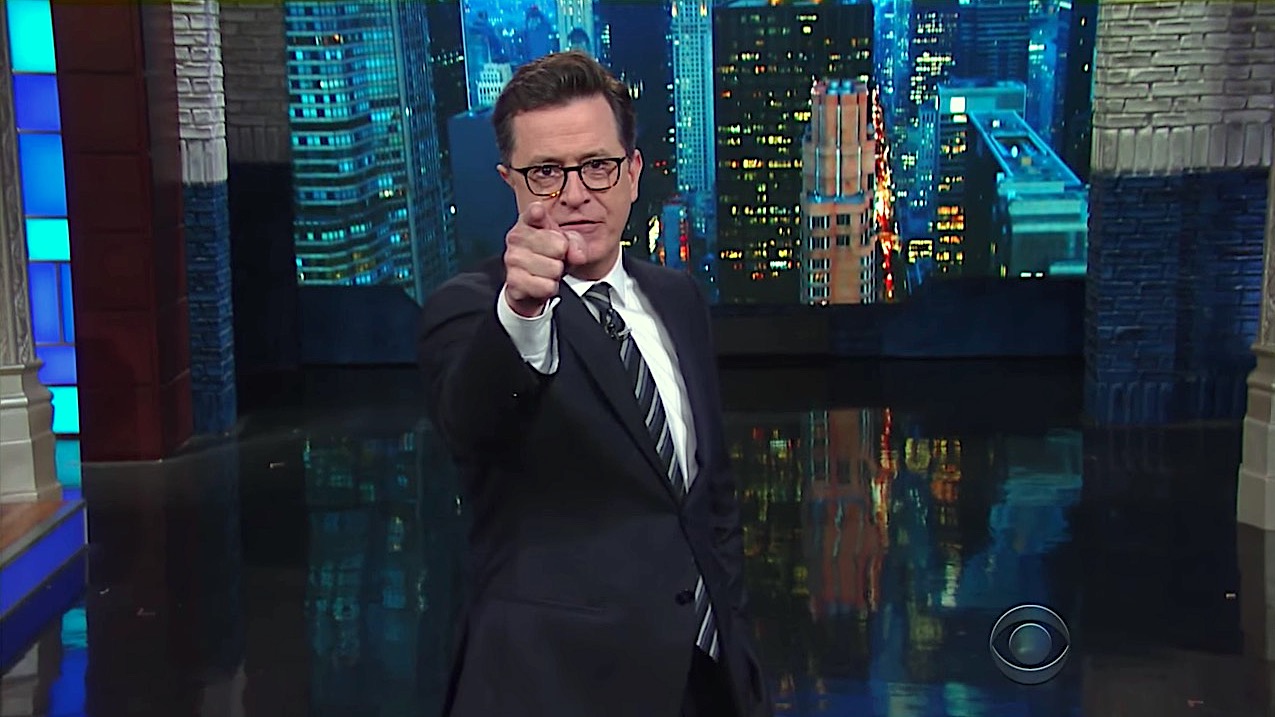Stephen Colbert uses pop culture to explain how Russian trolls helped Trump win with 'real fake news'


A free daily email with the biggest news stories of the day – and the best features from TheWeek.com
You are now subscribed
Your newsletter sign-up was successful
This week's confirmation vote on President Trump's Supreme Court nominee, Neil Gorsuch, could forever change the Senate. "Democrats aren't going to let Gorsuch get confirmed without a fight — sure, it's a fight they're going to lose, but those are the kind of fights Democrats love," Stephen Colbert explained on Monday's Late Show, looking a bit confused when the audience clapped loudly. Democrats now have enough no votes to filibuster Gorsuch, but if they do, Senate Republicans have threatened to use the "nuclear option," he explained, "which would upset Donald Trump, because he wants to be the first to use the nuclear option, possibly against North Korea, maybe Jake Tapper."
Some people argue that the Senate shouldn't confirm any of Trump's nominees until the end of the investigations into his team's possible collusion with Russia, Colbert said, pivoting fairly seamlessly to new developments on Trump and Russia. "It turns out the most effective thing that Russia did was change public opinion through targeted social media," using 1,000 trolls spreading "fake news" to Americans in key states, Colbert said. "Now, when I say 'fake news,' this is real fake news, not fake fake news that is real news that Donald Trump just doesn't like."
He explained how the army of Russian trolls and their bots apparently worked: "If enough people say something is popular, I might trust that it's good. It's like how if one person tells me Transformers is a good movie, I might not see it, but if everyone on Facebook is raving about it, I'll go. And by the time I realize I was lied to, Megatron is president."
The Week
Escape your echo chamber. Get the facts behind the news, plus analysis from multiple perspectives.

Sign up for The Week's Free Newsletters
From our morning news briefing to a weekly Good News Newsletter, get the best of The Week delivered directly to your inbox.
From our morning news briefing to a weekly Good News Newsletter, get the best of The Week delivered directly to your inbox.
Colbert ran through other news from Trumpworld, including Michael Flynn's request for immunity from prosecution ("So the question is, what does he know about Donald Trump? And: How could it be worse than what we know about Donald Trump?"), Trump walking out of an executive order signing ceremony without signing any executive orders ("That's the entire reason you're there! It's like going out to dinner and then ordering just the check") and Jared Kushner being sent to Iraq ("He wanted to go somewhere with less sectarian violence than the White House"). Watch below for all that and Colbert's imitation of Sean Spicer, landlord. Peter Weber
A free daily email with the biggest news stories of the day – and the best features from TheWeek.com
Peter has worked as a news and culture writer and editor at The Week since the site's launch in 2008. He covers politics, world affairs, religion and cultural currents. His journalism career began as a copy editor at a financial newswire and has included editorial positions at The New York Times Magazine, Facts on File, and Oregon State University.
-
 How the FCC’s ‘equal time’ rule works
How the FCC’s ‘equal time’ rule worksIn the Spotlight The law is at the heart of the Colbert-CBS conflict
-
 What is the endgame in the DHS shutdown?
What is the endgame in the DHS shutdown?Today’s Big Question Democrats want to rein in ICE’s immigration crackdown
-
 ‘Poor time management isn’t just an inconvenience’
‘Poor time management isn’t just an inconvenience’Instant Opinion Opinion, comment and editorials of the day
-
 ‘One Battle After Another’ wins Critics Choice honors
‘One Battle After Another’ wins Critics Choice honorsSpeed Read Paul Thomas Anderson’s latest film, which stars Leonardo DiCaprio, won best picture at the 31st Critics Choice Awards
-
 A peek inside Europe’s luxury new sleeper bus
A peek inside Europe’s luxury new sleeper busThe Week Recommends Overnight service with stops across Switzerland and the Netherlands promises a comfortable no-fly adventure
-
 Son arrested over killing of Rob and Michele Reiner
Son arrested over killing of Rob and Michele ReinerSpeed Read Nick, the 32-year-old son of Hollywood director Rob Reiner, has been booked for the murder of his parents
-
 Rob Reiner, wife dead in ‘apparent homicide’
Rob Reiner, wife dead in ‘apparent homicide’speed read The Reiners, found in their Los Angeles home, ‘had injuries consistent with being stabbed’
-
 Hungary’s Krasznahorkai wins Nobel for literature
Hungary’s Krasznahorkai wins Nobel for literatureSpeed Read László Krasznahorkai is the author of acclaimed novels like ‘The Melancholy of Resistance’ and ‘Satantango’
-
 Primatologist Jane Goodall dies at 91
Primatologist Jane Goodall dies at 91Speed Read She rose to fame following her groundbreaking field research with chimpanzees
-
 Florida erases rainbow crosswalk at Pulse nightclub
Florida erases rainbow crosswalk at Pulse nightclubSpeed Read The colorful crosswalk was outside the former LGBTQ nightclub where 49 people were killed in a 2016 shooting
-
 Trump says Smithsonian too focused on slavery's ills
Trump says Smithsonian too focused on slavery's illsSpeed Read The president would prefer the museum to highlight 'success,' 'brightness' and 'the future'
